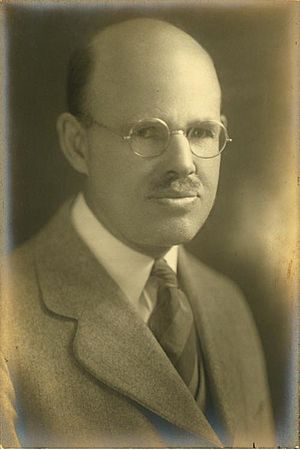Ellsworth Huntington facts for kids
Quick facts for kids
Ellsworth Huntington
|
|
|---|---|
 |
|
| Born | September 16, 1876 |
| Died | October 17, 1947 (aged 71) |
| Nationality | American |
| Alma mater | Harvard University Yale University |
| Scientific career | |
| Fields | Geography Climatology Human Ecology |
| Institutions | Yale University |
Ellsworth Huntington (born September 16, 1876 – died October 17, 1947) was an important American geographer. He taught at Yale University in the early 1900s. Huntington was famous for his ideas about how climate and the environment might affect human societies. He studied how these factors could influence things like economic growth and where people choose to live.
He was also a leader in several scientific groups. He served as president of the Ecological Society of America in 1917. Later, he led the Association of American Geographers in 1923.
Contents
Ellsworth Huntington: Explorer and Geographer
Ellsworth Huntington started his career teaching in Turkey at Euphrates College from 1897 to 1901. He loved to explore and learn about different parts of the world. He joined several expeditions to central Asia. These trips happened in 1903 and again from 1905 to 1906.
He wrote books about his adventures and discoveries in Asia. Two of his well-known books are Explorations in Turkestan (1905) and The Pulse of Asia (1907). These books shared his observations about the land and its people.
Studying Climate and People
From 1907 to 1915, Huntington taught geography at Yale. After that, he became a research associate there in 1917. This allowed him to focus on his main interests. He spent most of his time studying climatology, which is the study of climate. He also focused on anthropogeography. This field looks at how humans and their environment interact.
In 1916, he received a special award. It was the Elisha Kent Kane Gold Medal. This medal came from the Geographical Society of Philadelphia. It recognized his important work in geography.
The Yale Expedition to Palestine
In 1909, Huntington led a special trip called the Yale Expedition to Palestine. His goal was to understand how the land shaped human history. He wanted to see how geology, landforms, and climate (both past and present) affected people's lives. He believed these things played a huge part in how human ideas developed.
Huntington was also involved in the Foundation for the Study of Cycles. This group, started in 1941, studied patterns and cycles in nature and human events. He was on their first standing committee.
See also
 In Spanish: Ellsworth Huntington para niños
In Spanish: Ellsworth Huntington para niños
- Huntington family
 | Isaac Myers |
 | D. Hamilton Jackson |
 | A. Philip Randolph |

